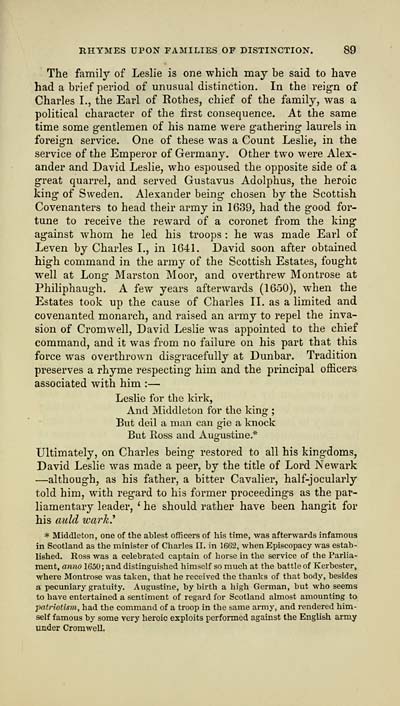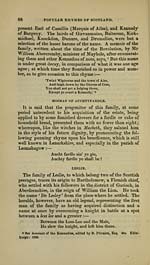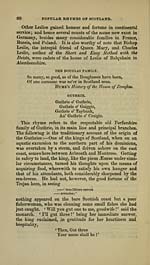Download files
Complete book:
Individual page:
Thumbnail gallery: Grid view | List view

RHYMES UPON FAMILIES OF DISTINCTION. 89
The family of Leslie is one which may be said to have
had a brief period of unusual distinction. In the rei^n of
Charles I., the Earl of Rothes, chief of the family, was a
political character of the first consequence. At the same
time some g-entlemen of his name were g'athering laurels in
foreig-n service. One of these was a Count Leslie, in the
service of the Emperor of Germany. Other two were Alex-
ander and David Leslie, who espoused the opposite side of a
g-reat quarrel, and served Gustavus Adolphus, the heroic
king- of Sweden. Alexander being- chosen by the Scottish
Covenanters to head their army in 1639, had the good for-
tune to receive the reward of a coronet from the king'
ag-ainst whom he led his troops : he was made Earl of
Leven by Charles L, in 1641. David soon after obtained
high command in the army of the Scottish Estates, fought
well at Long Marston Moor, and overthrew Montrose at
Philiphaugh. A few years afterwards (1650), when the
Estates took up the cause of Charles IL as a limited and
covenanted monarch, and raised an army to repel the inva-
sion of Cromwell, David Leslie was appointed to the chief
command, and it was from no failure on his part that this
force was overthrown disgracefully at Dunbar. Tradition
preserves a rhyme respecting him and the principal officers
associated with him : —
Leslie for the kirk,
And Middleton for the king ;
But deil a man can gie a knock
But Ross and Augustine.*
Ultimately, on Charles being restored to all his kingdoms,
David Leslie was made a peer, by the title of Lord Newark
— although, as his father, a bitter Cavalier, half-j ocularly
told him, with regard to his former proceeding's as the par-
liamentary leader, ' he should rather have been hangit for
his auld wark.''
* Middleton, one of the atlest officers of his time, was afterwards infamous
in Scotland as the minister of Charles II. in 1662, when Episcopacy was estab-
lished. Ross was a celebrated captain of horse in the service of the Parlia-
ment, anno 1650; and distinguished himself so much at the battle of Kerbester,
where Montrose was taken, that he received the thanks of that body, besides
a pecuniary gratuity. Augustine, by birth a high German, but who seems
to have entertained a sentiment of regard for Scotland almost amounting to
patriotism, had the command of a troop in the same army, and rendered him-
self famous by some very heroic exploits performed against the English army
under Cromwell.
The family of Leslie is one which may be said to have
had a brief period of unusual distinction. In the rei^n of
Charles I., the Earl of Rothes, chief of the family, was a
political character of the first consequence. At the same
time some g-entlemen of his name were g'athering laurels in
foreig-n service. One of these was a Count Leslie, in the
service of the Emperor of Germany. Other two were Alex-
ander and David Leslie, who espoused the opposite side of a
g-reat quarrel, and served Gustavus Adolphus, the heroic
king- of Sweden. Alexander being- chosen by the Scottish
Covenanters to head their army in 1639, had the good for-
tune to receive the reward of a coronet from the king'
ag-ainst whom he led his troops : he was made Earl of
Leven by Charles L, in 1641. David soon after obtained
high command in the army of the Scottish Estates, fought
well at Long Marston Moor, and overthrew Montrose at
Philiphaugh. A few years afterwards (1650), when the
Estates took up the cause of Charles IL as a limited and
covenanted monarch, and raised an army to repel the inva-
sion of Cromwell, David Leslie was appointed to the chief
command, and it was from no failure on his part that this
force was overthrown disgracefully at Dunbar. Tradition
preserves a rhyme respecting him and the principal officers
associated with him : —
Leslie for the kirk,
And Middleton for the king ;
But deil a man can gie a knock
But Ross and Augustine.*
Ultimately, on Charles being restored to all his kingdoms,
David Leslie was made a peer, by the title of Lord Newark
— although, as his father, a bitter Cavalier, half-j ocularly
told him, with regard to his former proceeding's as the par-
liamentary leader, ' he should rather have been hangit for
his auld wark.''
* Middleton, one of the atlest officers of his time, was afterwards infamous
in Scotland as the minister of Charles II. in 1662, when Episcopacy was estab-
lished. Ross was a celebrated captain of horse in the service of the Parlia-
ment, anno 1650; and distinguished himself so much at the battle of Kerbester,
where Montrose was taken, that he received the thanks of that body, besides
a pecuniary gratuity. Augustine, by birth a high German, but who seems
to have entertained a sentiment of regard for Scotland almost amounting to
patriotism, had the command of a troop in the same army, and rendered him-
self famous by some very heroic exploits performed against the English army
under Cromwell.
Set display mode to: Large image | Transcription
Images and transcriptions on this page, including medium image downloads, may be used under the Creative Commons Attribution 4.0 International Licence unless otherwise stated. ![]()
| Early Gaelic Book Collections > J. F. Campbell Collection > Popular rhymes of Scotland > (97) |
|---|
| Permanent URL | https://digital.nls.uk/81375758 |
|---|
| Description | Volumes from a collection of 610 books rich in Highland folklore, Ossianic literature and other Celtic subjects. Many of the books annotated by John Francis Campbell of Islay, who assembled the collection. |
|---|
| Description | Selected items from five 'Special and Named Printed Collections'. Includes books in Gaelic and other Celtic languages, works about the Gaels, their languages, literature, culture and history. |
|---|

